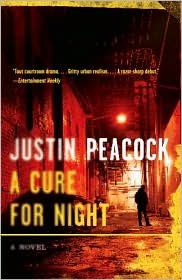 A Cure for Night, published in 2008 under the Black Lizard imprint, was an intriguing book, and an admirable debut novel by Justin Peacock. It’s a murder mystery told first-person by a public defender named Joel Deveraux, who worked for a high-flying law firm before heroin got him fired. Now he’s defending common criminals in Brooklyn, New York.
A Cure for Night, published in 2008 under the Black Lizard imprint, was an intriguing book, and an admirable debut novel by Justin Peacock. It’s a murder mystery told first-person by a public defender named Joel Deveraux, who worked for a high-flying law firm before heroin got him fired. Now he’s defending common criminals in Brooklyn, New York.
He gets assigned to help Myra Goldstein, a tough, street-smart public defender, with a murder case. A black man, a pot dealer, has been accused of shooting two men–killing a white Jewish college student, and wounding another drug dealer. Because it involves a white man gunned down in the projects, the case is drawing some attention.
Joel and Myra go about their business, talking to the various witnesses and other people involved, building a case to defend their client. There are no big themes–no racial issues, no cover-up by powerful people, no government conspiracy, no Mafia figures lurking in the background. It’s just a straightforward, fairly pedestrian procedural. As I progressed through the book, I kept waiting for a Big Theme to emerge, something to justify the book’s existence and my continued investment of time in reading it. Yet, I was engrossed.
So what kept my rapt attention? Three things.
- Well-drawn characters, particularly Joel and Myra. Joel’s backstory, including his occasional contacts with a friend back at his previous law firm, are quite interesting.
- The relationship between Joel and Myra. It was fun watching these very different people work together. Myra knows that Joel came from a big-money law firm, but doens’t know about his drug history.
- The glimpses into the criminal justice system. I learned a lot about how things work in a big-city public defender’s office. It can be messy and ambiguous and infuriating. The known guilty can go unpunished, and the innocent can get a raw deal. Sometimes things are exactly as they appear, sometimes not, but it’s hard to tell the difference.
The book’s title comes from this exchange between Joel and Myra:
Myra: “That’s what the criminal law is: it’s how the day tries to correct the night’s mistakes. Most of my cases, people have done something they never would’ve dreamed of doing in broad daylight.”
“What does that make us?” I said. “The night’s janitors?”
“We’re absolutely that,” Myra said, sipping her cosmo. “What else do we do but clean up after it? That’s why we’ll never run out of work. Not unless someone invents a cure for night.”
The book ended on a very satisfying note, and though the resolution should have been obvious, it took me by surprise.





